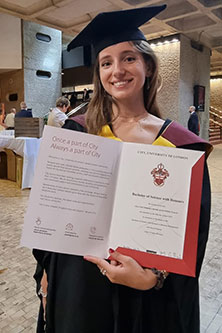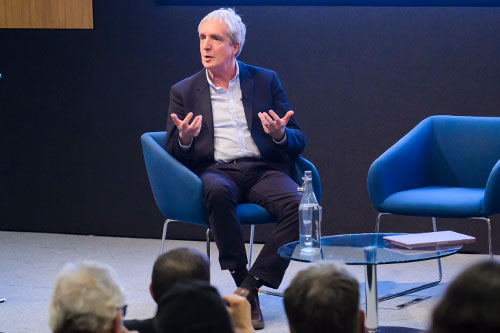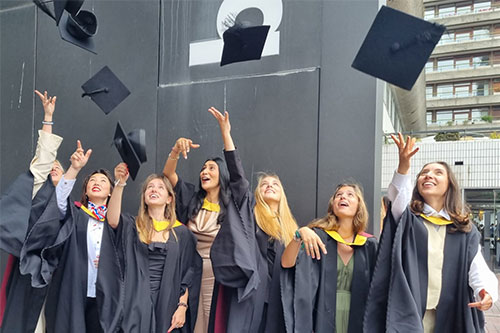Lila Vialat becomes Bayes’ first BSc Business Management with Social Purpose graduate
Undergraduate student finds purpose and hopes to better the world with her mix of business and charity sector knowledge
“It’s important to have a sense of purpose every day,” says Lila Vialat.
In July 2023, she became the first-ever student to graduate with a BSc in Business Management with Social Purpose from Bayes Business School (formerly Cass).

While she initially applied for a “straightforward” corporate business programme, in her second year, she selected to study the newly launched social purpose pathway.
“I’m very interested in business. Equally, I’ve always been drawn to doing good and to helping others,” Lila says. “Finding a way to mix and balance both interests through this programme made me very happy.”
The social purpose pathway: business with an ethical slant
The BSc Business Management programme was ranked 10th best in the UK for Business and Management Studies by the QS World University Rankings by Subject 2021.
In their first year, students follow a standard business degree– with modules such as management, economics, marketing, operations and supply chain management.
The undergraduates then have the choice of specialising in their second year, choosing from five different pathway options including the social purpose pathway.
The creation of the pathway was spearheaded by Dr Justin Davis Smith CBE, an Associate Professor in Voluntary Sector Management at Bayes’ Centre for Charity Effectiveness (CCE).
He decided to create the pathway after the resounding success of the “Business Management with Social Purpose” module, which saw 60 business students sign up in its first year of running.

Justin’s research focuses on voluntary sector management and the history of voluntary action. He is deeply embedded in the sector: among other senior executive roles, he was previously the CEO of Volunteering England, and he wrote the volunteering strategy for the 2012 London Olympic and Paralympic Games.
Gen Z want to make a change to today’s hybrid world of work
Today’s undergraduate population is primarily made up of Gen Z students. In Justin’s experience, this cohort of young people are the most committed to equality and diversity, to combatting climate change and to dealing with issues of modern-day slavery.
Student Lila, who is 21 years old, falls neatly within this category. In her personal time, she is learning British Sign Language, a process she began to become more inclusive in her day-to-day life and that she describes as “a lot of fun”. In her native France, she spent a year volunteering with the charity SOS Homophobie.
“Gen Z really want to make the world a better place, so what better arena to do that than to expose them to these issues at an early stage in their undergraduate education?” Justin says.

Throughout his career, Justin has seen the hybridisation of business and society with sectors becoming increasingly blurred and social policies becoming an important agenda item across the sectors.
Because of this, he believes this pathway programme will help students move fluidly between the private, public, voluntary and social enterprise sectors, better reflecting modern working patterns.
“Our graduates are the business leaders of the future,” Justin says. “What’s important is that these graduates will go into the world having a greater understanding of the role that business can play, not only in generating money, but in helping to tune up the planet and make it a more equitable place.”
Lecturer’s network helps Lila achieve her career goals
Dr Angela Ellis Paine, who is the programme’s pathway lead, spent the first decade of her career working in a social purpose organisation.
She has been researching social and community action for 25 years and her teaching closely aligns with her professional and academic background.
Pathway leader Angela describes Lila as a “fantastic student” and introduced her to employees at Macmillan Cancer and the British Red Cross, which are two major players in the British and international charity sector.
Lila worked with these two charities to collect data for her Applied Business Project – her final-year piece of coursework – which investigated how volunteering management has changed since the pandemic.
She found volunteers need much more informality and flexibility than they did before. Her results also revealed that people preferred to volunteer for smaller, local charities rather than big name organisations because the sense of community volunteering gives them is very important.
Based on her findings, she came up with recommendations on how the charities could adapt to these changes. She is continuing to work with the charities to disseminate her ideas.
“I’m very grateful to Angela for taking the time to help me direct my focus,” says Lila. “All my teachers took the time to have a chat with me and discuss my options. They helped me figure out what I wanted to do. I really felt their support.”
From September, Lila will be continuing her studies at the London School of Economics and Political Science with a master’s in International Employment Relations, an area she wants to work in so that she can be part of the conversations around inclusivity and policy.
“In my career, I want to do business with a social purpose because I want to feel like I’m making a positive change,” Lila says.
